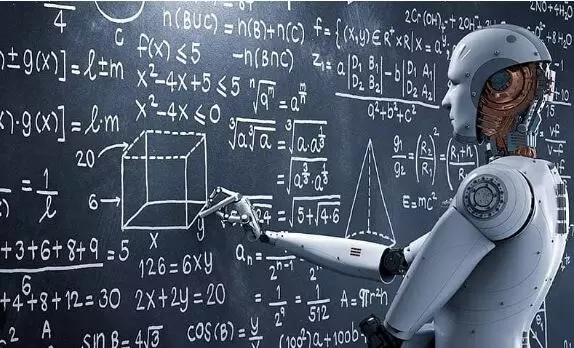
Adapting to AI: Role, job evolution, and learning opportunities
text_fieldsAlthough it is difficult to predict the future accurately, from the current situation, it is observed that artificial intelligence has started to change various sectors rapidly, mechanize jobs, and redefine the scope of various professions. As these unavoidable technological revolutions become a part of life, there are increasing concerns about job loss and acquiring the skills to adapt to the changes. Some sectors will withstand the onslaught of artificial intelligence, and some will perish.
The effect of AI on education and jobs is a hot topic for discussion nowadays. Drastic changes in the delivery of knowledge are visible now. Teaching and training are not just the imparting of knowledge. Educational workers, including teachers, play a crucial role in the intellectual and emotional development of learners. Artificial intelligence does not have the ability of human intelligence to apply different learning methods according to individual uniqueness and to provide motivation and timely guidance. While AI can help personal learning immensely, human intelligence can only support the development of critical thinking, creativity, and social skills. Teaching and learning will change to a great extent, but AI cannot completely replace expert teachers and trainers.
Scientific research, basic research, applied research, etc., which require extreme precision and accuracy, are areas where artificial intelligence is less influential. That's why research and development professions will stay in the future too. PhD and PDF courses will not lose their lustre in any case.
The health sector is witnessing revolutionary changes with the introduction of A.I. Many tasks related to diagnosis are likely to become redundant. Scans, X-rays, and blood tests have already begun to be mechanized. The ability to make complex decisions quickly and a keen understanding of the patient's psychological and physical needs are essential for those working in healthcare.
A clear understanding of human emotions, the ability to quickly solve complex problems, and the capacity to make decisions on moral issues are indispensable qualities for health workers such as doctors, nurses, therapists, etc. Though artificial intelligence can effectively assist in diagnosis and treatment methods, sensing problems through human touch and personal issues that can be understood by discussing with patients are beyond the capabilities of artificial intelligence. Doctors, nurses, therapists, and paramedical staff related to day-to-day treatment will also have job opportunities in the future since they cannot be replaced so easily.
Artificial intelligence has less opportunity to intervene in skilled occupations that require more physical labour. Jobs like construction, plumbing, wiring, carpentry, etc., require experience and problem-solving skills. Those working in such jobs need the ability to quickly identify circumstances and use human skills and physical conditions effectively. Therefore, complete mechanization is not possible in such jobs. Although artificial intelligence will make inroads into fields such as civil engineering, computer engineering, architecture, engineering, etc., these professions will survive since these are areas that require a considerable amount of creativity.
Musicians, writers, artists, designers, and others who work in the field of art have a wide range of awareness, capacity for emotional expression, and creativity. These skills are difficult for artificial intelligence to replicate. Although artificial intelligence can help with some aspects of artistic expression, creative thinking, learning from experience, and connecting with audiences are only possible with unique human intelligence. Though an AI tool can prepare an essay on a topic, it will fail if asked to prepare an emotional story or novel. AI cannot readily intervene in any jobs that require the support of a compassionate mind, including the medical profession.
Those working in the field of human resource management and counselling deal with complex interpersonal relationships, emotions, and the career prospects of individuals. The emotional intelligence required to understand and meet the specific needs of an organization's employees and workers has not yet been acquired by artificial intelligence. Although AI tools are helpful in administrative tasks, the fine-grained interactions, understanding, and proper management of the stakeholders that are the basis of the tasks described above are only possible with the human mind. The possibility of working in the field of social service will also always exist, as it requires compassion and care for others. Because of that, courses like MSW will not lose their relevance. Careers in the field of various types of counselling will also not be affected much.
Jobs in the fields of jurisprudence, philosophy, and ethics require deep thinking, moral reasoning, and the ability to understand people. Those who work in this field conduct complex discussions and analyses of nuanced human values where decisions are not easily possible and form preconceptions about the repercussions of all this in society. Although artificial intelligence can analyze the data fed to it, in-depth study, objective analysis, and interpretation of the subject are generally impossible. Only human intelligence can shine in spiritual and religious arenas where faith and dedication to the belief play an important role.
Artificial intelligence is less likely to affect the running of small enterprises like small shops, tailoring units, etc. AI tools will not be needed to understand the emerging situation and make the necessary changes in the running of small businesses and the launch of new start-ups. It is not easy to beat the ability of human intelligence to understand trends and analyze them carefully. There is good potential in the future to start and grow such small businesses. Establishing new startups also has good possibilities. Many skills in the field of management in large industries, commercial organizations, etc., cannot be imitated by artificial intelligence. AI cannot match the efficiency of human intelligence in roles such as strategic planning, high-level management, leadership, and policy development.
Artificial intelligence is making some jobs obsolete, but it is also creating new ones. Some jobs created with the emergence of AI are.
Prompt Engineer
As artificial intelligence techniques become more complex, the need for experts to communicate with the AI system and get the intended results is increasing to a large extent. A skilled prompt engineer does the job. Prompt engineering is a profession that will be in very high demand in the future.
AI Trainer
The AI Trainer is tasked with imparting enough training to the artificial intelligence platforms to provide the desired results. The AI Trainer teaches and trains the system on how the AI tool should respond accurately when prompted.
AI Auditor
As the use of artificial intelligence increases, ensuring the accuracy and reliability of the system becomes important. The AI auditor is the professional who ensures these objectives.
AI Ethicist
The AI Ethicist is responsible for ensuring that AI is used safely and ethically. They work on reducing bias and increasing fairness in algorithmic systems.
Apart from this, various job opportunities like data detective, cybersecurity analyst, AI business strategist, data broker, AI explainer, etc., will be available with an increase in the use of AI.
To learn artificial intelligence
The possibilities of artificial intelligence are endless. This scene is so dynamic that it is impossible to predict what will happen tomorrow. Many courses related to AI can be studied online and in classrooms. There are many good courses available within and outside Kerala. The quality of the institutions conducting the courses is very important. Data science, machine learning, deep learning, AI-based financial engineering, analytics, generative AI, chat GPT, explainable AI, prompt engineering, and countless other courses are available for those who are interested in learning AI and working in that field. IITs, NITs, IIITs, and good colleges across India are conducting various levels of courses in the field of AI. Many websites operating in the field of online education are conducting courses related to AI for free and at a very low fee. Such courses help understand the possibilities and scope of AI.
It is a reality that artificial intelligence has brought about revolutionary changes in the world of work. Some certain professions and courses will continue to thrive due to their inherent human characteristics. Careers that require qualities such as emotional discernment, creativity, complex decision-making, deep analysis of human experiences, and compassion will generally withstand the advance of artificial intelligence. While the potential for direct automation in these sectors may be low, it is still crucial to keep pace with the evolving labour market and the impact of AI. It is beneficial for individuals to continually update their skills and remain adaptable to ever-changing circumstances.
Being aware of industry trends is also important to stay competitive in an evolving job market. Furthermore, many professions would greatly benefit from leveraging artificial intelligence to enhance productivity and efficiency, rather than replacing human labor altogether. Additionally, acquiring the necessary training for job opportunities made available through the extensive use of artificial intelligence can help avoid future work-related challenges. If educational institutions replace outdated courses with software and hardware courses focusing on artificial intelligence, students can develop the skills needed to effectively face the future and succeed. Experts in the field advise being future-ready to meet challenges thrown at by AI. They say that AI itself will not take away jobs, but those skilled in AI definitely will.
Zubair Konikkal is an engineer with Akashavani, and volunteers as resource person for career counselling NGOs. The views expressed here are personal.
























